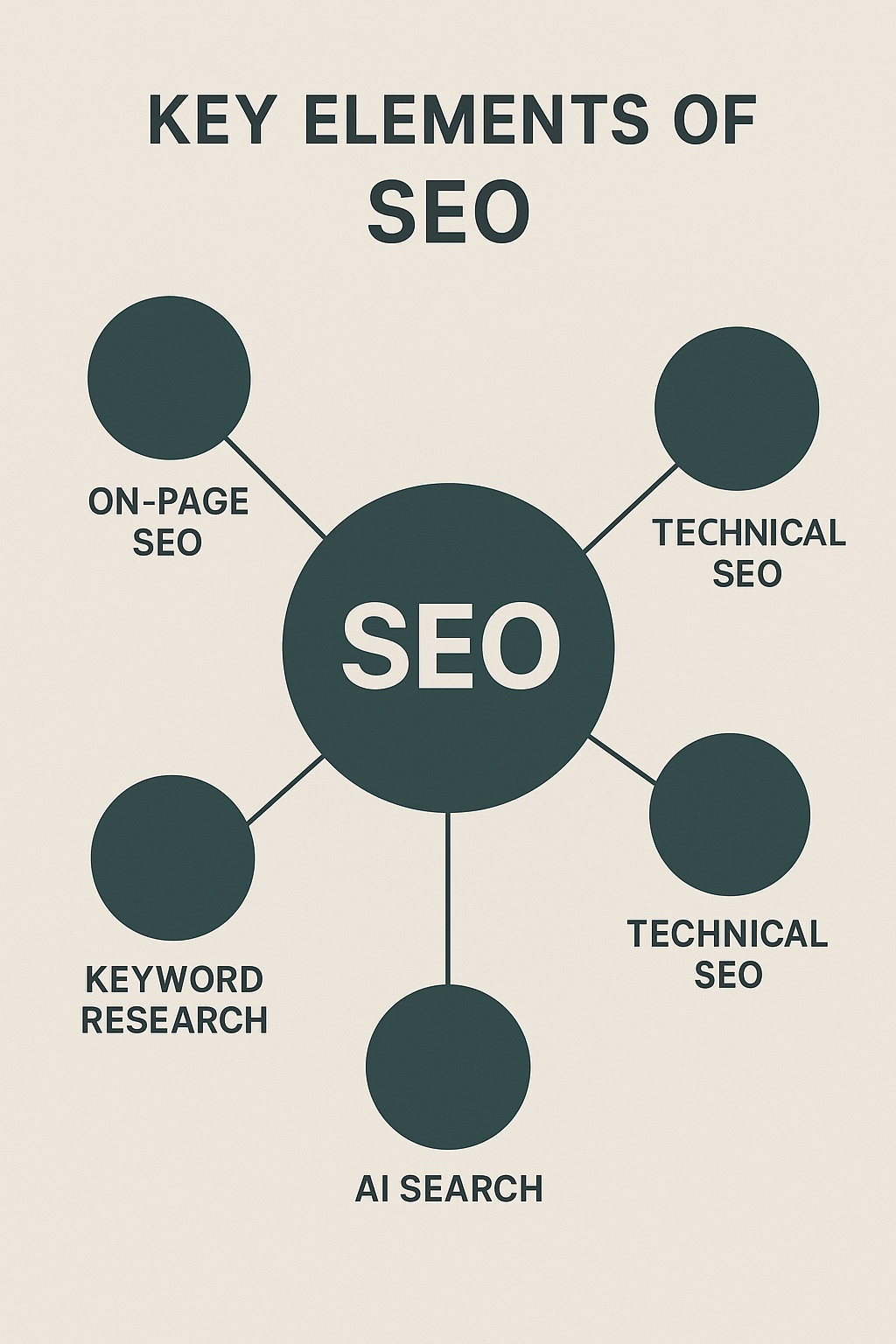In the ever-expanding digital landscape, search engines have become the indispensable gateways to information. To navigate this vast online realm, businesses and individuals alike rely on search engine optimisation (SEO) to enhance their visibility and attract targeted traffic. This comprehensive guide aims to unravel the intricacies of SEO, providing a clear and actionable framework for mastering this essential digital marketing strategy.
Key Takeaways
SEO = being discoverable. It’s the work that helps your site show up (and win clicks) on Google, Bing, YouTube, etc.without paying for every visit.
Win on the fundamentals. Strong SEO rests on five pillars: keyword research, helpful content, technical health (speed/mobile/structure), quality backlinks, and smooth user experience.
Match intent + show E-E-A-T. Create content that answers what searchers actually want, and prove Expertise, Experience, Authoritativeness, and Trustworthiness to earn rankings.
Think beyond blue links. SERP features (snippets, maps, images, videos) and platform shifts (YouTube, TikTok, Amazon) mean you should optimise for multiple surfaces, not just “10 blue links.”
Play the long game—and measure. SEO compounds over time. Track what works (GSC, GA4, tools like Ahrefs/SEMrush), refine, and pair with PPC when you need immediate results.
What is SEO?
SEO stands for search engine optimization, the process of improving the ranking of a website or web page in search engine results pages (SERPs). In simpler terms, it’s about making your website more easily discoverable by search engines like Google, Bing, and Yahoo. When your website ranks higher in search results, it attracts more organic traffic, leading to increased website visits, leads, and sales.
Why is SEO Important?
In the ever-evolving digital landscape, where attention spans are shorter than ever and competition is fierce, businesses are constantly seeking innovative ways to stand out from the crowd. Among the plethora of marketing strategies available, search engine optimisation (SEO) reigns supreme as an indispensable tool for navigating the ever-changing digital terrain.
The Organic Traffic Juggernaut
SEO, in its essence, is the art of crafting a website that resonates with search engines, propelling it to the coveted top spots in search results pages (SERPs). This prime positioning translates into a flood of organic traffic, the lifeblood of any website, accounting for an impressive 53% of all website visits.
The Financial Powerhouse
The impact of SEO extends far beyond increased website traffic; it’s a veritable money-making machine. The global SEO industry is projected to reach a staggering $122.11 billion by 2028, a testament to its ability to drive real business results.
Understanding the Search Journey
Today’s search landscape is more fragmented than ever. Users seek information, research products, and discover new services across a diverse range of platforms, from traditional search engines like Google and Bing to social media giants like YouTube and TikTok.
The Amazon Factor
Amazon, the retail behemoth, has emerged as a formidable player in the search arena. A whopping 61% of U.S. online shoppers start their product search on Amazon, a significant shift from the traditional search engine dominance.
The Trillion-Search Phenomenon
Trillions of searches are conducted every year, highlighting the immense power of search engines as the primary gateway to information. This makes it imperative for businesses to ensure their websites are “search engine friendly” across all relevant platforms.
Ranking Higher, Revenue Rising
Improved visibility and higher rankings in search results translate directly into a positive impact on the bottom line. By outranking competitors, businesses can attract more organic traffic, leading to increased conversions and a healthier revenue stream.
The SERP Battlefield
The SERPs, the coveted real estate on search results pages, are a battleground for businesses vying for attention. Search features like knowledge panels, featured snippets, maps, images, videos, and People Also Ask sections add another layer of complexity to the search landscape.
Sustainability: The SEO Advantage
Unlike other marketing channels where traffic dries up once the campaign ends, SEO’s impact is long-lasting. The benefits of good SEO work endure, providing a sustainable stream of organic traffic.
The Holistic Marketing Foundation
SEO serves as the bedrock of holistic marketing, where every aspect of a company’s online presence plays a role. By understanding user intent, businesses can align their strategies across various channels, including paid and organic campaigns, website content, and social media platforms.
SEO: The Driving Force of Key Business Goals
SEO is not just about traffic; it’s about achieving key business objectives. Whether it’s driving conversions, increasing website visits, or boosting sales, SEO is the driving force behind these critical goals.
Trust in the Digital Age
SEO builds trust, a valuable commodity in the digital world. A website that consistently ranks high is perceived as authoritative and trustworthy, qualities that are highly regarded by search engines and users alike.
SEO, the ever-evolving digital chameleon, has adapted to the changing landscape, proving its resilience and effectiveness in today’s fragmented search environment. By embracing SEO as an indispensable tool, businesses can navigate the digital world with confidence, knowing that they are investing in a sustainable strategy that drives traffic, builds trust, and ultimately, achieves their business goals.
SEO Key Elements:

SEO encompasses a wide range of strategies and techniques, but the core elements that contribute to successful SEO include:
- Keyword Research: Identifying relevant keywords that users are searching for.
- Content Optimisation: Creating high-quality, informative, and keyword-rich content.
- Technical SEO: Ensuring your website’s technical structure is optimised for search engines.
- Link Building: Acquiring backlinks from reputable websites to enhance your website’s authority.
- User Experience: Ensuring your website is user-friendly, mobile-friendly, and provides a positive user experience.
Technical SEO: Laying the Foundation for Search Engine Success
In the competitive realm of search engine optimization (SEO), technical aspects play a pivotal role in determining a website’s visibility and ranking. It’s like constructing a sturdy building; technical SEO forms the solid foundation upon which content and other SEO strategies can flourish.
Crawl-ability: The Gateway to Search Engine Discovery
The first step in technical SEO is ensuring that search engine bots can effortlessly crawl and index your website’s content. This involves creating a clear and structured website architecture, with well-defined URLs, navigation menus, and internal linking patterns. Remember, search engines like Google are like explorers traversing the digital landscape; make it easy for them to find and understand your website’s content.
User Experience: A Search Engine’s Priority
Search engines aren’t just interested in finding your website; they care about whether users enjoy the experience. Technical SEO, therefore, encompasses optimising your website for speed, mobile-friendliness, and overall user experience. Factors like Core Web Vitals, mobile responsiveness, and avoiding intrusive pop-ups are crucial for signalling to search engines that your website provides a positive user experience.
Structured Data: Enhancing Search Engine Understanding
Structured data, also known as schema markup, acts as a translator, helping search engines comprehend the nuances of your website’s content. By adding structured data to your website, you provide search engines with rich information about your content, such as product details, event schedules, and business information. This can lead to richer and more informative search results, enhancing your website’s visibility and engagement.
Web Hosting, CMS, and Security: Unsung Heroes of SEO
While often overlooked, web hosting, content management systems (CMS), and site security play significant roles in technical SEO. A reliable and fast web hosting provider ensures that your website loads quickly, while a user-friendly CMS enables you to manage and optimize your website effectively. Additionally, robust site security protects your website from potential hacks and malware, maintaining trust with search engines and users alike.
Technical SEO is not a one-time project; it’s an ongoing process that requires continuous monitoring and adaptation. As search engine algorithms evolve and user expectations change, staying up-to-date with technical SEO best practices is essential for maintaining a strong foundation for your website’s SEO success.
Content SEO: Crafting Compelling Content for People and Search Engines
In the ever-evolving landscape of search engine optimisation (SEO), content remains the undisputed king. High-quality, engaging content not only attracts and satisfies your target audience but also signals to search engines that your website is a valuable resource. To truly master SEO, you must strike a delicate balance between optimising content for both people and search engines.
Understanding Your Audience: The Foundation of Content SEO
The first step in content SEO is to understand your target audience’s needs, interests, and search behavior. This involves conducting thorough audience research, analysing website analytics, and engaging with your audience through surveys and social media. By understanding your audience, you can tailor your content to their specific needs and preferences, increasing the likelihood of engagement and positive interactions.
Crafting High-Quality Content: The Heart of SEO
At the heart of content SEO lies the creation of high-quality, informative, and engaging content. This means producing content that is:
- Relevant: Address topics that are relevant to your target audience and align with their search queries.
- Unique and Original: Offer fresh perspectives, insights, and information that sets your content apart from competitors.
- Well-Written: Ensure your content is grammatically correct, free of errors, and easy to read and understand.
- Up-to-Date: Provide accurate and current information that reflects the latest industry trends and developments.
- Multimedia-Rich: Incorporate engaging multimedia elements like images, videos, and infographics to enhance the user experience.
Optimising Content for Search Engines: The Technical Side of SEO
While content quality is paramount, technical optimisation plays a crucial role in content SEO. This involves optimising specific elements that search engines use to understand and index your content:
- Title Tags: Craft concise and informative title tags that accurately reflect the content of your page.
- Meta Descriptions: Write compelling meta descriptions that summarise the content and entice users to click through.
- Header Tags (H1-H6): Utilise header tags to structure your content, highlighting key headings and subheadings.
- Image Alt Text: Provide descriptive alt text for images to improve accessibility and search engine understanding.
- Open Graph and Twitter Cards Metadata: Implement Open Graph and Twitter Cards metadata to enhance social media sharing and rich snippets.
Content SEO: An Ongoing Process
Content SEO is an ongoing process that requires continuous refinement and adaptation. As search engine algorithms evolve and user preferences change, you must regularly evaluate and improve your content strategy. This involves monitoring keyword performance, analysing user engagement metrics, and staying abreast of emerging trends in your industry.
By prioritising high-quality content that resonates with both people and search engines, you can establish your website as a trusted authority in your field, attract organic traffic, and achieve sustainable SEO success.
Off-Page SEO: Expanding Your Reach Beyond Your Website
While on-page SEO focuses on optimising the content and structure of your website, off-page SEO extends your reach beyond your website, enhancing your brand’s online presence and reputation. It encompasses a range of activities that indirectly influence your website’s ranking and visibility in search engine results pages (SERPs).
Link Building: The Cornerstone of Off-Page SEO
Link building is the cornerstone of off-page SEO, involving acquiring backlinks from reputable websites to your own. These backlinks serve as votes of confidence, signalling to search engines that your website is a valuable and trustworthy source of information. Acquiring backlinks from diverse, high-quality websites can significantly boost your website’s authority and ranking.
Brand Building and PR: Establishing Brand Prominence
Brand building and public relations (PR) play a crucial role in off-page SEO by enhancing your brand’s visibility and reputation. Brand building techniques, such as social media marketing, content marketing, and influencer marketing, help establish your brand as an expert and thought leader in your industry. PR activities, such as press releases and media outreach, generate positive mentions and backlinks, further solidifying your brand’s credibility.
Content Marketing: Attracting Links through Valuable Content
Content marketing is a powerful tool for off-page SEO, as it attracts links and engagement through the creation of high-quality, informative content. This can include blog posts, infographics, videos, podcasts, and other forms of multimedia content. By providing valuable content that resonates with your target audience, you encourage other websites to link to your content, boosting your backlink profile.
Social Media Marketing: Amplifying Your Reach
Social media marketing is an essential component of off-page SEO, as it allows you to connect with your audience, build relationships, and amplify your content. By actively engaging on relevant social media platforms, sharing valuable content, and participating in industry discussions, you can attract potential visitors to your website and generate backlinks from social media shares.
Listing Management: Ensuring Accuracy and Visibility
Listing management is an often overlooked aspect of off-page SEO, yet it plays a crucial role in ensuring that your business information is accurate and consistent across various directories, review sites, and online platforms. By claiming, verifying, and optimising your listings, you can improve your brand’s visibility and attract potential customers.
Reputation Management: Responding to Feedback
Reputation management is an integral part of off-page SEO, as it involves actively monitoring and responding to online reviews, mentions, and feedback. By addressing negative feedback promptly and professionally, you can protect your brand’s reputation and maintain trust with potential customers.
Off-Page SEO: A Holistic Approach
Off-page SEO is not just about acquiring backlinks; it’s about creating a comprehensive online presence that reinforces your brand’s authority and credibility. By combining link building, brand building, content marketing, social media engagement, listing management, and reputation management, you can effectively expand your reach beyond your website and achieve sustainable SEO success.
Delving into the Specialised Facets of Search Engine Optimisation
The realm of search engine optimisation (SEO) encompasses a diverse range of specialised areas, each with its unique set of strategies and challenges. These specialised branches extend beyond the fundamentals of “regular SEO,” demanding additional expertise and tailored approaches to achieve optimal results.
Ecommerce SEO
E-commerce SEO focuses on optimising online stores to rank higher in search engine results pages (SERPs) for relevant keywords. This involves optimising category pages, product pages, faceted navigation, internal linking structures, product images, product reviews, schema, and more.
Enterprise SEO
Enterprise SEO is the practice of optimising large-scale websites, typically with over 1 million pages, for search engines. This type of SEO often involves dealing with multiple stakeholders and delays in implementing SEO changes due to the size and complexity of the organisation.
International SEO
International SEO focuses on optimising websites for visibility in search engines across different countries and languages. This involves understanding the nuances of search engine algorithms in different regions, as well as translating and adapting content for local audiences.
Local SEO
Local SEO focuses on optimising websites for visibility in local search results. This involves managing and obtaining reviews and business listings, as well as optimising website content and meta descriptions for local keywords.
News SEO
News SEO focuses on optimising news websites for speed and visibility in search engines. This involves understanding best practices for paywalls, section pages, news-specific structured data, and more.
SEO Strategies:
SEO strategies can be broadly categorised into two main pillars:
- On-Page SEO: Optimising your website’s content and structure to improve its ranking in search results.
- Off-Page SEO: Building backlinks and establishing your website’s authority through external factors.
SEO Tools:
Numerous SEO tools can aid in your SEO efforts, providing valuable insights and data to guide your optimisation strategies. Popular SEO tools include:
- Google Search Console: Provides insights into your website’s performance in search results.
- Google Analytics: Tracks website traffic and user behavior.
- Ahrefs: Analyses backlinks and competitor SEO strategies.
- SEMrush: Offers comprehensive SEO research and analysis tools.
E-E-A-T: A Cornerstone of SEO Success
In the ever-evolving realm of search engine optimisation (SEO), E-E-A-T stands as a fundamental pillar, shaping the quality and credibility of content that search engines value. This acronym represents Expertise, Experience, Authoritativeness, and Trustworthiness – four essential components that determine a website’s ability to rank higher in search results.
Expertise: Demonstrating Knowledge and Proficiency
Expertise refers to the depth of knowledge and proficiency exhibited by the creators of the content. Search engines seek out content that is authored by individuals who possess a clear understanding of the subject matter, ensuring that users encounter accurate and reliable information.
Experience: A Proven Track Record of Success
Experience encompasses the creators’ established track record in their respective fields. Search engines recognise and value individuals with a demonstrated history of success, as it indicates their ability to produce trustworthy and valuable content.
Authoritativeness: Establishing Recognition and Influence
Authoritativeness refers to the perceived credibility and influence of the creators and the website as a whole. Search engines look for content that is recognised as a trusted source of information within its industry, demonstrating its ability to inform and guide users effectively.
Trustworthiness: Fostering Confidence and Reliability
Trustworthiness is the cornerstone of E-E-A-T, ensuring that users can confidently rely on the information presented. Search engines favour websites that exhibit transparency, integrity, and a commitment to providing accurate and unbiased content.
Adhering to the principles of E-E-A-T is not merely a technical SEO strategy; it is a commitment to providing users with high-quality, trustworthy content that truly addresses their needs. By prioritising expertise, experience, authoritativeness, and trustworthiness, you can establish your website as a credible authority in your field and achieve sustainable SEO success.
SEO Success:
SEO is an ongoing process that requires consistent effort and adaptation to the ever-evolving search engine algorithms. However, by implementing a well-structured SEO strategy and utilising effective techniques, you can effectively enhance your website’s visibility, attract targeted traffic, and achieve sustainable growth in the digital realm.
Demystifying SEM: Unraveling the Interplay of Organic and Paid Search Strategies
In the bustling digital marketplace, search engines serve as gateways to connect businesses and individuals with their target audience. Search engine marketing (SEM) has emerged as a formidable strategy to harness the power of search engines, driving traffic and enhancing visibility. While SEM and search engine optimisation (SEO) are often used interchangeably, understanding their distinct roles is crucial for maximising digital marketing efforts.
The Umbrella of SEM: Encompassing Organic and Paid Search Strategies
SEM, an umbrella term for search marketing, encompasses both organic and paid search strategies. Organic search, also known as SEO, focuses on optimising website content and structure to improve its ranking in search engine results pages (SERPs) without paid advertising. On the other hand, paid search, primarily represented by pay-per-click (PPC) advertising, involves purchasing ad placements on search engine results pages.
PPC: The Art of Paid Search Advertising
PPC, the paid counterpart of SEM, involves bidding on relevant keywords to display ads on search engine results pages. Advertisers pay a fee each time a user clicks on their ad, making PPC a highly targeted and measurable form of advertising.
The Synergy of SEM: Combining Organic and Paid Strategies
While SEO and PPC can function independently, their true power lies in their synergistic potential. A well-crafted SEM strategy combines the strengths of both organic and paid search, leveraging SEO to build long-term brand visibility and PPC to drive immediate traffic and conversions.
A Coin with Two Sides: SEO and PPC as Complementary Strategies
Imagine SEM as a coin, with SEO and PPC representing its two distinct sides. SEO, the organic side, focuses on building a strong foundation for long-term visibility, while PPC, the paid side, provides a powerful tool for immediate traffic and conversions. Together, they form a comprehensive SEM strategy that drives both brand awareness and lead generation.
Harnessing the Power of SEM: A Strategic Approach
Effective SEM requires a strategic approach, considering factors such as target audience, budget, and desired outcomes. Businesses should carefully evaluate their goals and resources to determine the optimal balance between SEO and PPC investments.
SEM as an Essential Digital Marketing Tool
SEM stands as an essential tool in the digital marketing arsenal, empowering businesses to connect with their target audience and achieve their marketing objectives. By understanding the interplay between SEO and PPC, businesses can craft a comprehensive SEM strategy that drives organic and paid traffic, propelling their brand to the forefront of search engine results.
Google’s Arsenal of SEO Resources: Your Guide to Search Engine Success
Navigating the intricacies of search engine optimisation (SEO) can be a daunting task, especially with the ever-evolving algorithms and constantly shifting landscape. Fortunately, Google, the world’s leading search engine, has provided a wealth of resources to equip you with the knowledge and tools necessary to conquer SEO and enhance your website’s visibility.
Google Search Essentials: The Foundation of SEO Success
Google Search Essentials serves as the cornerstone of your SEO journey, providing a comprehensive guide to the technical requirements and spam policies that govern search engine rankings. This essential resource delves into the nitty-gritty of website structure, content quality, and link building, ensuring that your website adheres to Google’s guidelines and maximizes its potential for success.
SEO Starter Guide: Your Quick Start to SEO Mastery
For those seeking a concise overview of SEO fundamentals, Google’s SEO Starter Guide is the perfect primer. This handy guide outlines the key best practices and essential strategies that form the foundation of effective SEO. From crafting high-quality content to optimising website structure, the SEO Starter Guide provides a clear roadmap for beginners to navigate the world of search engine optimisation.
Search Quality Evaluator Guidelines: Understanding Google’s Judgment
To gain a deeper understanding of how Google evaluates the quality of search results, the Search Quality Evaluator Guidelines offer invaluable insights. This document delves into the criteria that Google’s human raters consider when assessing websites, including factors such as expertise, authoritativeness, and trustworthiness. By understanding these guidelines, you can align your SEO efforts with Google’s expectations and increase your chances of achieving top rankings.
Google’s SEO resources provide a treasure trove of knowledge and guidance, empowering you to optimise your website and achieve sustainable success in the ever-changing world of search engine optimisation. Whether you’re a seasoned SEO professional or just starting out, these resources equip you with the tools and expertise to navigate the complexities of SEO and propel your website to the forefront of search engine results.
Conclusion:
SEO is a powerful tool for businesses and individuals seeking to dominate the digital landscape. By understanding the fundamentals of SEO, implementing effective strategies, and utilising the right tools, you can propel your website to the forefront of search engine results, achieving long-term success in the ever-expanding digital world.
FAQs
Yes, you can certainly do SEO on your own. However, it’s important to understand that SEO is an ongoing process that requires continuous effort and adaptation. If you’re willing to invest the time and effort, you can learn the basics of SEO and implement effective strategies to improve your website’s ranking in search results.
- Cost-effectiveness: You can avoid the expense of hiring an SEO professional.
- Control: You have complete control over your SEO strategy.
- Learning: You can gain valuable knowledge and skills in SEO.
- Time-consumption: SEO can be a time-consuming process.
- Complexity: SEO can be complex and technical.
- Staying up-to-date: Search engine algorithms are constantly evolving, requiring you to stay informed about the latest trends.
- Set realistic goals: SEO takes time and effort, so don’t expect overnight results.
- Be patient: SEO is a long-term investment, so don’t get discouraged if you don’t see immediate results.
- Track your progress: Use analytics tools to monitor your website’s traffic and ranking.
- Be consistent: SEO requires ongoing effort to maintain and improve results.
- Google Search Console: A free tool from Google that provides insights into your website’s performance in search results.
- Moz SEO Learning Center: A website offering various free SEO resources, including tutorials, articles, and webinars.
- Ahrefs Blog: A blog that provides news and insights on the latest SEO trends.
If you lack the time, resources, or expertise to handle SEO on your own, consider hiring an SEO professional. They can provide expert guidance, tailored strategies, and efficient implementation to maximize your SEO efforts.
Remember, SEO is a journey, not a destination. By consistently implementing effective SEO strategies, you can gradually improve your website’s ranking, attract more targeted traffic, and achieve your online goals.
There are a number of things that you can do to optimise your website for SEO, including:
- Keyword research: Identifying the keywords that people are using to search for information related to your website.
- Content creation: Creating high-quality content that is relevant to your target audience and includes your target keywords.
- Link building: Acquiring backlinks from reputable websites to your website.
- On-page optimisation: Optimising your website’s title tags, meta descriptions, and header tags.
- Technical SEO: Ensuring that your website is technically sound and easy for search engines to crawl.
SEO is both free and paid. While you can implement many SEO strategies without paying any money, there are also paid services that can help you improve your website’s ranking in search engine results pages (SERPs).
Free SEO involves implementing strategies that don’t require any financial investment. This includes activities such as:
- Keyword research: Identifying the keywords that people are using to search for information related to your website
- Content creation: Writing high-quality content that is relevant to your target audience and includes your target keywords
- On-page optimisation: Optimising your website’s title tags, meta descriptions, and header tags
- Technical SEO: Ensuring that your website is technically sound and easy for search engines to crawl
Paid SEO involves using paid services to improve your website’s ranking in SERPs. This can include services such as:
- Link building: Acquiring backlinks from reputable websites to your website
- PPC (pay-per-click) advertising: Purchasing ad placements on SERPs
- SEO tools: Subscribing to SEO tools that provide data and insights to help you optimize your website
Yes, you can do SEO for free. However, it will require more time and effort than hiring an SEO professional. Here are some tips for doing SEO for free:
- Research keywords: Identify the keywords that people are using to search for information related to your website. You can use free tools like Google Keyword Planner or Ubersuggest.
- Create high-quality content: Write informative and engaging content that is relevant to your target audience and includes your target keywords. You can use free platforms like Medium or WordPress to create and publish your content.
- Optimize your website for mobile: Make sure your website is easy to use on mobile devices. You can use free tools like Google’s Mobile-Friendly Test to check your website’s mobile-friendliness.
- Submit your website to search engines: Submit your website to Google Search Console and Bing Webmaster Tools. This will help search engines index your website and make it searchable.
- Build backlinks: Get other reputable websites to link to your website. You can do this by guest blogging, participating in online forums, and submitting your website to directories.
- Track your progress: Use free analytics tools like Google Analytics to track your website’s traffic and ranking.




